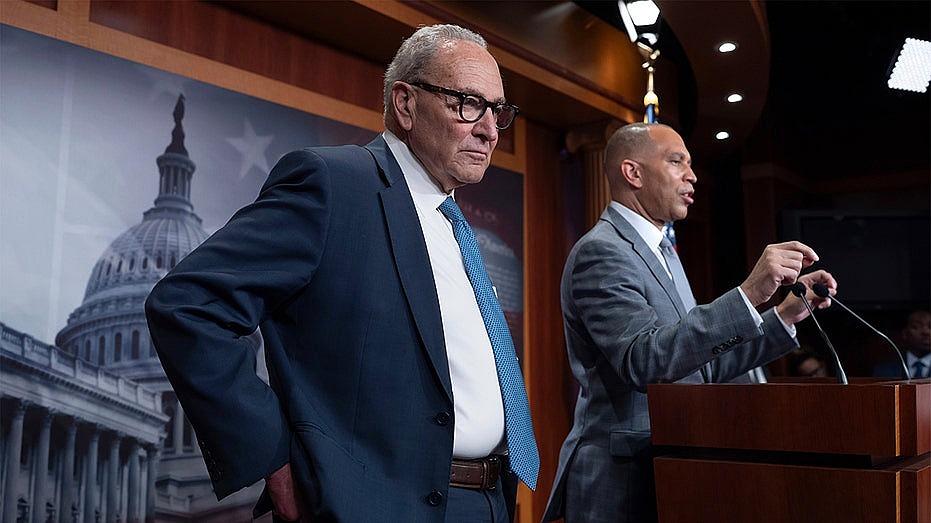Food stamp benefits for 42 million Americans in jeopardy today amid shutdown
As the government shutdown stretches into its 32nd day, millions of Americans are facing the grim prospect of losing food benefits, specifically through the Supplemental Nutrition Assistance Program (SNAP), starting Saturday. The ongoing stalemate in the Senate reflects a deep divide between Democrats and Republicans over how to address the funding crisis. Senate Democrats argue that President Donald Trump could quickly resolve the situation by utilizing an emergency contingency fund of approximately $5 billion to sustain SNAP benefits. They contend that the administration’s refusal to act is a deliberate choice that exacerbates the suffering of vulnerable populations. “We think you can have both,” asserted Senate Minority Leader Chuck Schumer, D-N.Y., emphasizing the need for bipartisan cooperation to ensure food security.
On the other hand, congressional Republicans maintain that the shutdown will only end if Democrats agree to reopen the government, thus enabling full funding for SNAP and other essential programs. Senate Majority Leader John Thune, R-S.D., expressed frustration over what he perceives as political gamesmanship, stating, “This isn’t a political game; these are real people’s lives we’re talking about.” The U.S. Department of Agriculture (USDA) has warned that SNAP funds will be depleted by November 1 if the deadlock continues, further intensifying the urgency of the situation. A recent memo from the USDA clarified that while there is a contingency fund, it cannot be accessed without the underlying program being funded, leaving millions of families in a precarious position as the shutdown drags on.
The situation has sparked heated exchanges in the Senate, particularly between Senators Luján and Thune, highlighting the emotional weight of the debate. With around 42 million Americans relying on SNAP, the stakes are incredibly high. Lawmakers from both parties are expressing concern about the potential fallout, with some advocating for piecemeal funding bills to address the immediate needs of SNAP recipients. However, the path forward remains uncertain, as Speaker Mike Johnson, R-La., has indicated he will only reconvene the House if Senate Democrats agree to reopen the government. As discussions continue, the urgency to find a solution grows, especially with the looming deadline for food benefits that countless families depend on for their daily sustenance.
Related articles:
– Link 1
– Link 2
With no deal in place to reopen the government and no action from the administration to make up for a funding shortfall in federal benefits, millions of Americans are at risk of losing food benefits starting on Saturday.
The argument raging in the Senate mirrors the same argument that has so far seen the
government shutdown
for 32 days.
Senate Democrats contend that with the stroke of a pen — like on expiring Obamacare subsidies — President
Donald Trump
could easily see the Supplemental Nutrition Assistance Program (SNAP), more commonly known as food stamps, funded as the shutdown drags on.
SENATE GOP DIVIDED AS MILLIONS RISK LOSING FOOD AID IN SHUTDOWN STANDOFF
“We don’t want to pit healthcare and food, [Republicans] do,” Senate Minority Leader
Chuck Schumer
, D-N.Y., said. “We think you can have both.”
But congressional Republicans and the administration argue that food stamp benefits, and numerous other government programs, could be fully funded if Schumer and his caucus would unlock the votes to reopen the government.
Democrats are suing the Trump administration in part over its refusal to use the SNAP emergency fund, which they contend has about $5 billion, to fund the program. But a recent memo by the U.S. Department of Agriculture (USDA) argued there was no legal standing to use the fund and that federal SNAP funds would run dry by Nov. 1 if Democrats did not vote to end the shutdown.
A pair of federal judges ruled on Friday that the administration would have to pay out the food stamp benefits for November, either in full or in part.
USDA Secretary Brooke Rollins affirmed the memo during a Friday press conference, “There is a contingency fund at USDA, but that contingency fund, by the way, doesn’t even cover, I think, half of the $9.2 billion that would be required for November SNAP. But it is only allowed to flow if the underlying program is funded.”
USDA CHIEF WARNS ‘WE’RE RIGHT AT THE CLIFF’ AS 40 MILLION AMERICANS BRACE FOR FOOD STAMP CUTOFF
Nothing typified the dysfunction over the benefits, which 42 million Americans rely on, more than an explosion on the Senate floor this week between Senate Majority Leader John Thune, R-S.D., and Sen. Ben Ray Luján, D-N.M.
Luján tried to force a vote on his bill that would fund both food stamps and the Special Supplemental Nutrition Program for Women, Infants, and Children (WIC), but was promptly blocked by an angry Thune, who argued that Democrats have had 13 chances to fund the program through the shutdown.
“This isn’t a political game, these are real people’s lives we’re talking about,” Thune said. “And you all have just figured out, 29 days in, that, oh, there might be some consequences.”
Democrats contend that Trump and the U.S. Department of Agriculture, which oversees the program, are actively choosing not to fund the program, given that there is roughly $5 billion in an emergency contingency fund that the administration could dip into.
Sen. Chris Murphy, D-Conn., charged that it was “Trump’s choice.”
“He’s got $5 billion that he could be using right now to help people, to help people feed their kids, and he’s choosing not to do that,” he said. “What he’s doing is sick, deliberately making this shutdown more painful as a means to try to get Democrats to sign on to an immoral, corrupt budget.”
The argument has been much the same in the
House of Representatives
, which passed the GOP’s federal funding bill on Sept. 19. Both Republicans and Democrats appear worried, however.
SCHUMER, DEMS CALL ‘BULL—-‘ ON TRUMP ADMINISTRATION OVER FOOD STAMP SHUTDOWN THREAT
“I just left the local food pantry in my district and was speaking with seniors there, and they’re all very concerned,” Rep. Nicole Malliotakis, R-N.Y., whose district is home to more than 120,000 SNAP recipients, told Fox News Digital. “They agree with me that the Senate, beginning with their own senator, Senator Schumer, should vote to continue the existing funding levels that they previously voted for four times and prevent this unnecessary pain.”
There is a desire among both sides of the aisle to fund the program before the government reopens, but the likelihood of piecemeal bills, or “rifle-shots,” making it to the floor was squashed by Thune during the week.
Both Luján and Sen. Josh Hawley, R-Mo., have bills that would fund food stamps, with Hawley’s bill having 29 bipartisan co-sponsors, including Schumer.
One of the co-sponsors, Sen. James Lankford, R-Okla., told Fox News Digital that the administration’s argument, in part, was because the $5 billion in the contingency fund was not enough to cover a month’s worth of food stamp benefits.
“It’s hurricane season, and that’s what it’s really satisfying,” he said. “But it’s not enough, either way. We’ve tried 14 times to be able to fully fund SNAP — once with an actual appropriation bill … to say, ‘Let’s just fund it for the entire year,’ 13 times to do short term. It’s a little frustrating. Some of my Democratic colleagues are saying, ‘Well, find some way to fund it for a week or so, move things around.’”
But on the House side, it’s not clear if Democrats nor Republicans have the appetite for piecemeal bills during the shutdown.
Speaker
Mike Johnson
, R-La., has consistently said he will only call the House back into session if Senate Democrats vote to reopen the government.
Meanwhile, Fox News Digital asked Rep. Joe Neguse, D-Colo., during a press conference on SNAP this week whether he was discussing food stamp legislation with his Senate counterparts.
“I’m familiar with the proposals, and I know that many of my colleagues … have proposed legislation here in the House as well. Those conversations will continue,” Neguse said. But, “ultimately,” he added, “legislation doesn’t need to be passed in order for these funds to be released. It is the law.”
Eric
Eric is a seasoned journalist covering US Politics news.



